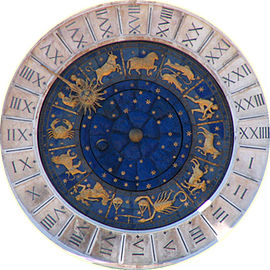History of astrology
| Astrology | |||||||||||
|---|---|---|---|---|---|---|---|---|---|---|---|
| The astrological signs | |||||||||||
| Astrology categories | |||||||||||
|
Expand list |
|||||||||||
| Branches of astrology | |||||||||||
| The planets in astrology | |||||||||||
|
|
Astrology project | ||||||||||
| Abū Maʿshar | |
|---|---|

A Latin translation of Abū Maʿshar's De Magnis Coniunctionibus ("Of the great conjunctions"), Venice, 1515.
|
|
| Native name | Abū Maʿshar, Jaʿfar ibn Muḥammad al-Balkhī |
| Born |
c. 787 Balkh, Khurasan |
| Died |
c. 886 Wāsiṭ, Iraq |
| Residence | Balkh, Baghdad |
| Academic background | |
| Influences | Aristotle, al-Kindi |
| Academic work | |
| Era | Islamic Golden Age |
| Main interests | Astrology, Astronomy |
| Influenced | Al-Sijzi, Albertus Magnus, Roger Bacon, Pierre d'Ailly, Pico della Mirandola. |
Expand list
for reference
Astrological beliefs in correspondences between celestial observations and terrestrial events have influenced various aspects of human history, including world-views, language and many elements of social culture.
Among Indo-European peoples, astrology has been dated to the 3rd millennium BC, with roots in calendrical systems used to predict seasonal shifts and to interpret celestial cycles as signs of divine communications. Until the 17th century, astrology was considered a scholarly tradition, and it helped drive the development of astronomy. It was commonly accepted in political and cultural circles, and some of its concepts were used in other traditional studies, such as alchemy, meteorology and medicine. By the end of the 17th century, emerging scientific concepts in astronomy, such as heliocentrism, were irrevocably undermining the theoretical basis of astrology, which subsequently lost its academic standing.
In the 20th century, astrology gained broader consumer popularity through the influence of regular mass media products, such as newspaper horoscopes.
Astrology, in its broadest sense, is the search for human meaning in the sky; it seeks to understand general and specific human behavior through the influence of planets and other celestial objects. It has been argued that astrology began as a study as soon as human beings made conscious attempts to measure, record, and predict seasonal changes by reference to astronomical cycles.
Early evidence of such practices appears as markings on bones and cave walls, which show that lunar cycles were being noted as early as 25,000 years ago; the first step towards recording the Moon’s influence upon tides and rivers, and towards organizing a communal calendar. With the Neolithic agricultural revolution new needs were also met by increasing knowledge of constellations, whose appearances in the night-time sky change with the seasons, allowing the rising of particular star-groups to herald annual floods or seasonal activities. By the 3rd millennium BC, widespread civilisations had developed sophisticated awareness of celestial cycles, and are believed to have consciously oriented their temples to create alignment with the heliacal risings of the stars.
...
Wikipedia

